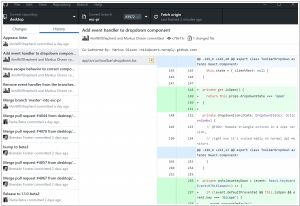Top 10 Source Code Versioning and Management tools
September 26, 2025 | Editor: Michael Stromann
22
Cloud services and local repository software that allow to store source code and control the changes to files made by multiple developers.
1
GitHub is the best place to share code with friends, co-workers, classmates, and complete strangers. Over seven million people use GitHub to build amazing things together. Free public repositories, collaborator management, issue tracking, wikis, downloads, code review, graphs and much more…
2
GitLab offers git repository management, code reviews, issue tracking, activity feeds and wiki’s. Enterprises install GitLab on-premise and connect it with LDAP and Active Directory servers for secure authentication and authorization. A single GitLab server can handle more than 25,000 users but it is also possible to create a high availability setup with a multiple active servers.
3
Azure DevOps Server is a Microsoft product that provides version control, reporting, requirements management, project management, automated builds, testing and release management capabilities. It covers the entire application lifecycle and enables DevOps capabilities.
4
Bitbucket is a free code DVCS hosting site for Git and Mercurial. Manage your development with a hosted wiki, issue tracker and source code. Host, manage, and share Git and Mercurial repositories in the cloud. Free, unlimited private repositories for up to 5 developers give teams the flexibility to grow and code without restrictions.
5
SourceForge is an Open Source community resource dedicated to helping open source projects be as successful as possible. We thrive on community collaboration to help us create a premiere resource for open source software development and distribution.
6
Google Developers is now the place to find all Google developer documentation, resources, events, and products. Project Hosting on Google Code provides a free collaborative development environment for open source projects.
7
RhodeCode Enterprise is the secure collaboration environment that works the way you do — with your workflows, your permissions, on your platforms. Safely tucked behind your firewall. Increased project security and permissions control along with real-time repository news feeds give managers a birds eye view on project progress and complete control over access to highly sensitive data, driving projects to come in on-time and under budget with no compromise on either productivity or security.
8
Assembla workspaces allow to accelerate software teams. Ticketing and issue management, Subversion, Git, Mercurial, Wiki, and other collaboration tools to accelerate development. Unite your team with a single activity stream view.
9
FishEye provides a read-only window into your Subversion, Perforce, CVS, Git, and Mercurial repositories, all in one place. Keep a pulse on everything about your code: Visualize and report on activity, integrate source with JIRA issues, and search for commits, files, revisions, or people.
10
Launchpad is a software collaboration platform that provides bug tracking, code hosting using Bazaar and Git, code reviews, translations, mailing lists, answer tracking and FAQs, specification tracking
11
Apache Subversion is a version control system distributed as open source under the Apache License. Software developers use Subversion to maintain current and historical versions of files such as source code, web pages, and documentation. Subversion exists to be universally recognized and adopted as an open-source, centralized version control system characterized by its reliability as a safe haven for valuable data; the simplicity of its model and usage; and its ability to support the needs of a wide variety of users and projects, from individuals to large-scale enterprise operations.
12
Beanstalk allows designers and developers to store source code, track changes, and collaborate with their team through Subversion and Git version control. Imagine a single process to commit code, review with the team, and deploy the final result to your customers.
13
StarTeam brings world-class agile change management to organizations with multiple repositories. Streamline workflows by connecting tools, processes and teams via a single repository. StarTeam maintains and tracks changes to source code, defects and features, to gain control over distributed and collaborative development. Maintain visibility and traceability across your software assets.
Important news about Source Code Versioning and Management tools
2020. GitHub is now free for all teams

GitHub made all of its core features free for all users. That means free unlimited private repositories with unlimited collaborators for all, including teams that use the service for commercial projects, as well as up to 2,000 minutes per month of free access to GitHub Actions, the company’s automation and CI/CD platform. Teams that want more advanced features like code owners or enterprise features like SAML support will still have to upgrade to a paid plan, but those now start at $4 per month and user for the Teams plans instead of the previous $9, with the Enterprise plan starting at $21 per month and user.
2018. GitHub business users now get access to public repos

GitHub, the code hosting service Microsoft recently acquired, is launching a couple of new features for its business users that will make it easier for them to access public repositories on the service. Traditionally, users on the hosted Business Cloud and self-hosted Enterprise were not able to directly access the millions of public open-source repositories on the service. Now, with the service’s release, that’s changing, and business users will be able to reach beyond their firewalls to engage and collaborate with the rest of the GitHub community directly. With this, GitHub now also offers its business and enterprise users a new unified search feature that lets them tap into their internal repos but also look at open-source ones.
2018. Microsoft acquired GitHub

Microsoft has acquired popular code sharing and collaboration service GitHub for $7.5B. From the smallest startups to giants like Microsoft, companies use the cloud-based service to work on code collaboratively. GitHub has 27 million software developers working on 80 million repositories of code. So it seems like a natural acquisition for the new Microsoft, which under CEO Satya Nadella has increased its focus on serving software developers via cloud services — whether they’re coding for Microsoft Windows or not. In the case of GitHub, it’s used for everything from websites to iPhone apps. Microsoft’s GitHub acquisition also mean we’ll start to see even closer integration between Microsoft’s developer tools and the service.















